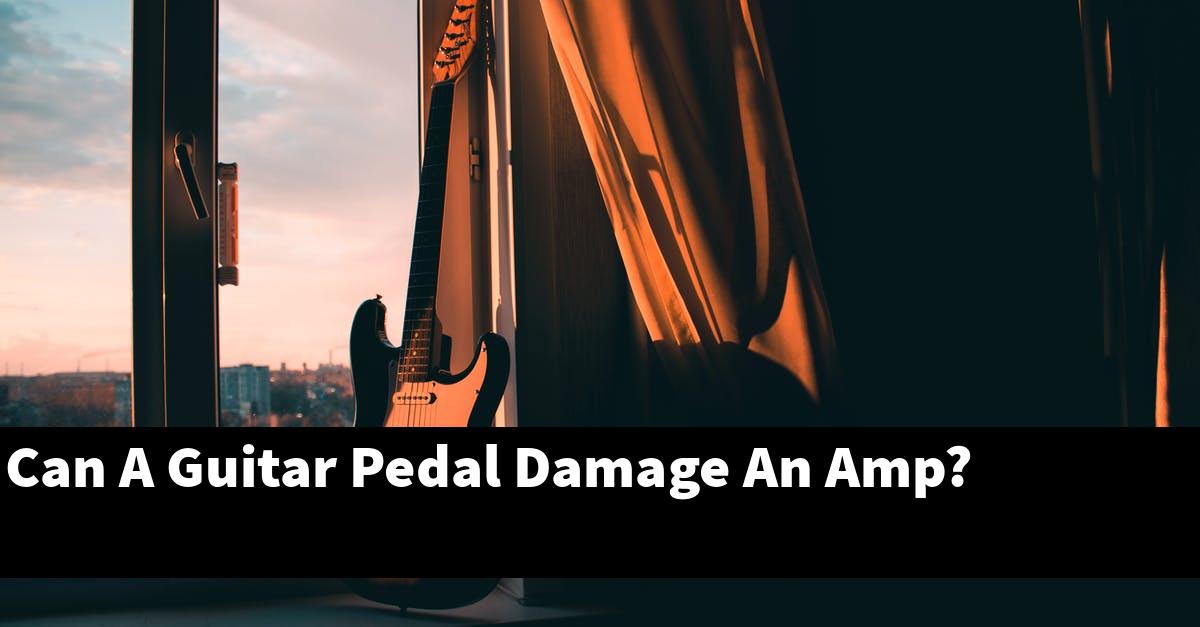A guitar pedal can damage an amp if it is not used properly. If the pedal is not compatible with the amp, it can cause damage to the amp.
This article will be discussing whether or not a guitar pedal can damage an amp.
What are the risks of using a guitar pedal with an amp?
When using a guitar pedal with an amplifier, there are a few risks to be aware of. The most common risk is that of feedback. Feedback can occur when the guitar pedal is not properly grounded, or when the amp is set to too high of a volume. If feedback does occur, it can damage the amplifier and/or the speaker.
Additionally, if the guitar pedal is not properly grounded, it can cause a shock to the person using it. Another risk to consider is that of overloading the amplifier. This can happen if the guitar pedal is used with an amplifier that is not designed to handle the extra power. This can damage the amplifier and/or the speaker.
Finally, it is important to be aware that some guitar pedals can cause radio interference. This can be a problem if the guitar pedal is used in an area where there is a lot of electronic equipment, such as a recording studio.
What are some ways to prevent damaging an amp with a guitar pedal?
There are a few ways to prevent damaging an amp with a guitar pedal. One way is to make sure the pedal is properly powered. Another way is to use a pedal that is designed to work with an amp. Finally, if you are using a pedal that is not designed to work with an amp, you can use a buffer to protect the amp.
What are some signs that a guitar pedal is damaging an amp?
If you’re hearing strange noises coming from your amplifier, it may be a sign that your guitar pedal is damaging the amp. These noises can include crackling, pops, or even squealing sounds. If you notice any of these noises, it’s important to stop using the pedal right away to avoid further damage.
Another sign that a guitar pedal may be damaging your amplifier is if the sound quality suddenly becomes poorer. This can be difficult to notice at first, but over time it will become more apparent. If you notice that your amplifier sounds muffled or distorted, it’s a good idea to stop using the pedal and have the amplifier checked by a professional.
Finally, if your amplifier starts acting oddly after you’ve been using a guitar pedal, it’s a good idea to get it checked out. Amplifiers can sometimes develop strange issues after being used with a damaged pedal, so it’s best to have it looked at by a professional to be safe.
Is it possible to repair damage caused by a guitar pedal to an amp?
It is possible to repair damage caused by a guitar pedal to an amp. However, it is important to note that the damage caused by the pedal may vary depending on the type of pedal and the severity of the damage.
For example, a pedal that causes a short circuit may be more difficult to repair than a pedal that simply causes a loss of sound quality. In addition, the type of amplifier may also affect the repairability of the damage caused by the pedal. For instance, an amplifier with a tube preamp section may be more difficult to repair than a solid state amplifier.
Can I use a guitar pedal in an amp?
Yes, you can use a guitar pedal in an amp, but there are a few things to keep in mind. First, make sure the pedal is designed for use with an amp. Some pedals are not meant to be used with an amp, and will not work properly or may even damage the amp.
Second, make sure the pedal is compatible with the amp. Some pedals will work with any amp, but others may only work with certain types or models of amps. Finally, make sure the pedal is properly powered. Some pedals need to be powered by an AC adapter, while others may need batteries.
Can a guitar damage an amp?
If you play an electric guitar with a faulty or damaged amplifier, it is possible to cause serious damage to your amp. If your amplifier is not properly maintained, the risk of damage to your amp increases.
Why does my amp buzz when I use a pedal?
If your amplifier is buzzing when you use a pedal, it’s most likely due to a ground loop issue. This can happen when the ground path between your amplifier and pedal is not direct, causing a loop that amplifies the signal and creates the buzz. To fix this, you can try using a different power adapter for your pedal, or use a DI box to break the ground loop.
Can you plug a pedal into an amp?
The answer is yes, you can plug a pedal into an amp, but there are a few things you need to know first. The first is that not all pedals are compatible with all amps. There are some pedals that are designed to work with specific amps, so you’ll need to check that your pedal is compatible with your amp before you try to plug it in.
The second thing to know is that not all amps have an effects loop. An effects loop is a dedicated input/output on the amp that is used specifically for connecting pedals. If your amp doesn’t have an effects loop, you can still connect your pedal to the amp, but you’ll need to use the amp’s clean channel.
The last thing to keep in mind is that some pedals require a power supply, so you’ll need to make sure that your pedal has a power supply or that your amp has a power supply that is compatible with the pedal.
Cocmlusion
A guitar pedal can damage an amp if it is not used properly. If the pedal is not compatible with the amp, it can cause damage to the amp. To avoid this, make sure the pedal is properly powered and compatible with the amp.
If you’re using a pedal that is not designed for use with an amp, use a buffer to protect the amp.


